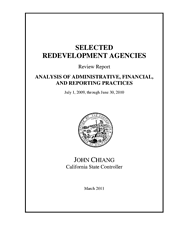Redevelopment agencies shortchanged California schools $40 million, controller’s review finds
The review of redevelopment agencies comes as the Legislature is poised to vote on Gov. Jerrry Brown's proposal to eliminate municipal redevelopment agencies as part of his budget plan. One city, Palm Desert, spent public money meant for improving slums and blight on a luxury golf course.
Times' Data Desk: How is your redevelopment agency spending money?
"The lack of accountability and transparency is a breeding ground for waste, abuse, and impropriety," Chiang said in a statement. "In whatever form local redevelopment takes in the future, the level of oversight and openness must be consistent with the amount of public dollars entrusted to their care."
 The report comes as many redevelopment advocates fear that the Legislature is leaning toward abolishing the agencies, which run on $5 billion a year in property taxes. Brown wants to send the money to schools and counties instead, and take $1.7 billion this year to balance the budget. Proponents of the redevelopment agencies, including the mayors of many of California cities, are outraged, arguing that the program generates jobs and builds thousands of homes for poor and working people. Critics say the money could be better used for other services, and that it is often misspent.
The report comes as many redevelopment advocates fear that the Legislature is leaning toward abolishing the agencies, which run on $5 billion a year in property taxes. Brown wants to send the money to schools and counties instead, and take $1.7 billion this year to balance the budget. Proponents of the redevelopment agencies, including the mayors of many of California cities, are outraged, arguing that the program generates jobs and builds thousands of homes for poor and working people. Critics say the money could be better used for other services, and that it is often misspent.Chiang dispatched auditors around the state in January, saying he wanted to provide "factual, empirical information about how these agencies perform and what they bring to the communities they serve." In the past, his office has declined to scrutinize redevelopment.
The review also found that the agencies' outside auditors often did a poor job and that the agencies had used affordable housing money in improper ways.
None of the 18 agencies met all filing requirements for financial reports, the review found. Some filed reports in pieces; some did not file at all. Two agencies -- in Pittsburg and Calexico -- also made questionable loans to their cities' general funds. Pittsburg lent $16.6 million last fiscal year without interest. Most of the money was unspent, which allowed the city to earn interest on those funds.
RELATED:
-- Jessica Garrison
Photo: California Controller John Chiang. Credit: Damian Dovarganes / Associated Press
"Emeryville is shown to have spent $48.8 million from FY 2001-01 to 2007-08 but failed to develop land within five years."
ReplyDeleteThis is an incorrect satement. What the table that you are refencing claims is that Emeryville did not develop land that was purchased with housing funds within 5 years. The table also says that one 5 year extension is allowed, but it does not say whether a 5 year extension was granted in Emeryville's case. The table really doesn't tell us very much and the story you have posted here as well as the Controller's report don't even mention Emeryville.
And your point is?
ReplyDeleteYour headline would read: State Controller Report Shows Emeryville Failed To Develop Land As Mandated vs the actual headline which reads: State Controller Report Shows Emeryville Failed To Develop Land As Mandated.
As an aside, the report also shows specifically that Emeryville may not be spending money efficiently. You may wish to differ with this assessment, flatly stating that's an incorrect statement; perhaps, "Emeryville may not be spending funds efficiently" is more they way you would characterize it?
Neither the State Controller's report nor the Los Angeles Times article showed that the Emeryville Redevelopment Agency failed to develop land as mandated. The Times specifically shows that land purchased with housing funds was not developed within 5 years. However State law allows one 5 year extension and the Times doesn't tell us whether an extension was granted, so there is no way to tell from the information presented whether the Agency failed to develop land as mandated by State law. We have no way to tell whether funds were spent efficiently. Time is only one factor of efficiency. Value is an arguably more important factor. If delaying development provides greater value then funds are still spent efficiently.
ReplyDeleteSo who are you going to believe, the California State Controller John Chiang and his exhaustive study or Mr Anonymous Emeryville Redevelopment Agency cheerleader (who probably works for the city) Tattler commentator?
ReplyDeleteMr Anonymous, how's the Emeryville Redevelopment Agency done with it's duty to build family housing in town? I guess it's off limits to criticize such a wonderful government agency.
I live in an affordable family unit developed with assistance from the Agency, so I'd say the Agency is doing a good job, otherwise I wouldn't live in Emeryville.
ReplyDeleteOutlier.
ReplyDelete